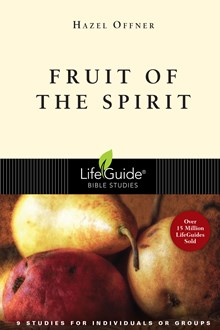Overview
In this 9-session study, you will look closely at the fruit of the Spirit described by Paul in Galatians 5:22–23 by examining other biblical passages that exemplify these virtues. These Old and New Testament passages will enrich your understanding of how God’s Spirit is at work in your life.
Introduction
Getting the Most Out of Fruit of the Spirit
This section introduces the topic, explains the structure followed in each study, and offers tips for those approaching the study on their own as well as those participating in a group.
Session One
Love
The word love is often abused these days. It is used in the context of close, cozy feelings; of ecstatic, exuberant sexual passion; and of conditional commitments. But from the Christian point of view, what is this thing called love? In this study we’ll see what John, Jesus’ disciple and close friend, says about love.
1 John 4:7–16
Session Two
Joy
When we hear the word joy, we are likely to connect it with special events. One such amazing event we see in Scripture is Jesus’ encounter with believers on the road to Emmaus. This study explores what their encounter with Jesus can teach us about joy—not just during special experiences but also in our daily lives.
Luke 24:33–53
Session Three
Peace
We live in tense, anxious times. How can we know the peace of God when the world seems to be falling to pieces? This study examines Isaiah’s prophetic message delivered to God’s people who were living in a situation of profound difficulty: exile in Babylon.
Isaiah 43:1–7
Session Four
Patience
Let’s face it: Some people drive us up the wall. Jesus sets a powerful example of patience, particularly in his care for the disciples who bickered about being the greatest. This study explores Jesus’ teachings in response to their bickering, exploring the mindset and attitude we ought to have toward others.
Matthew 18:21–35
Session Five
Kindness
How can the fruit of kindness poured though us make a difference in our cynical culture? This study explores this virtue by looking at the countercultural kindness David showed to Jonathan’s descendants.
2 Samuel 9
Session Six
Goodness
Psalm 107 is the classic exposition of God’s goodness. God’s actions reveal goodness in its highest and purest form. His goodness provides the standard for developing this fruit in our own lives.
Psalm 107
Session Seven
Faithfulness
Jehoshaphat, king of Judah, learned about faithfulness the hard way. He made an alliance that was against God’s will; the results were disastrous and God was displeased. In his desperation, Jehoshaphat cried out to God. This study examines God’s answer which serves as an amazing illustration of faithfulness.
2 Chronicles 20:1–30
Session Eight
Gentleness
For some, the word gentleness has negative connotations such as weakness or being a pushover. Others recognize gentleness as a sorely-needed quality in our harsh world, but aren’t sure how to cultivate it in their own lives. What ought Christian gentleness look like? The Apostle Paul’s treatment of the Thessalonians provides a powerful model of the gentleness God desires in us.
1 Thessalonians 2:1–12
Session Nine
Self-Control
We all struggle with self-control and temptations often blind our better judgment. In 1 Samuel 26, David faces the powerful temptation of choosing between self-gratification and self-control. His response can encourage us in our struggles.
1 Samuel 26
Total number of pages: 63
Hazel Offner has worked with students in the InterVarsity Christian Fellowship chapter at the University of Illinois for many years. She has also helped to lead and promote hundreds of Bible study groups in the Champaign-Urbana area.





